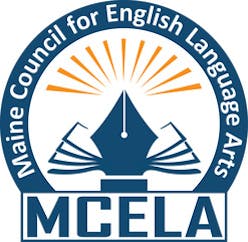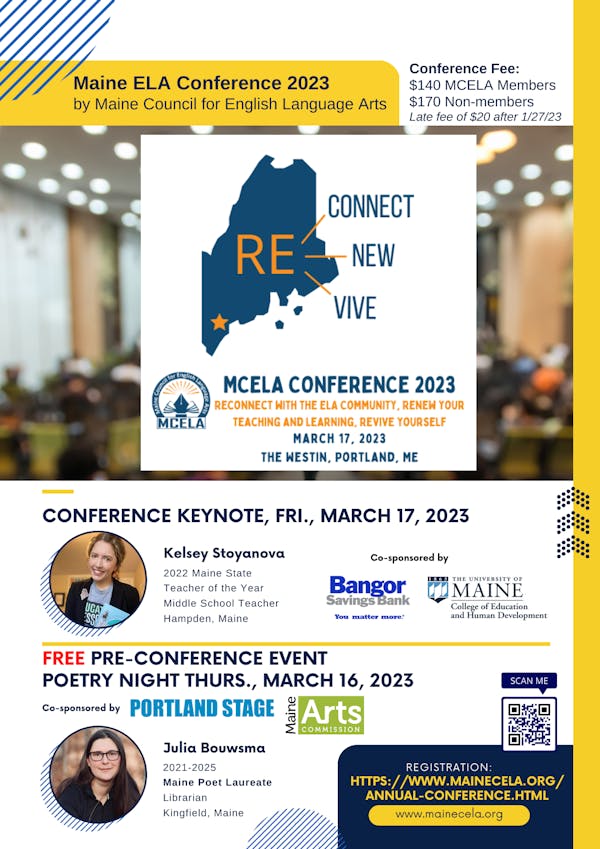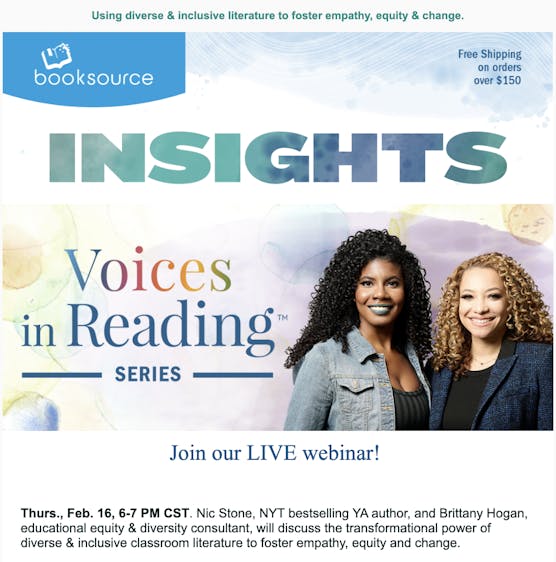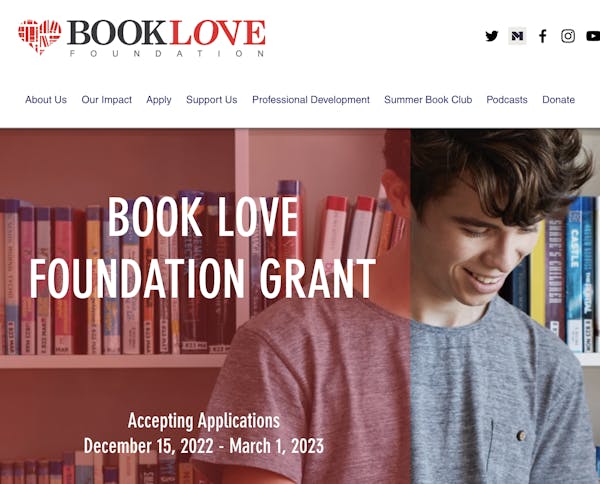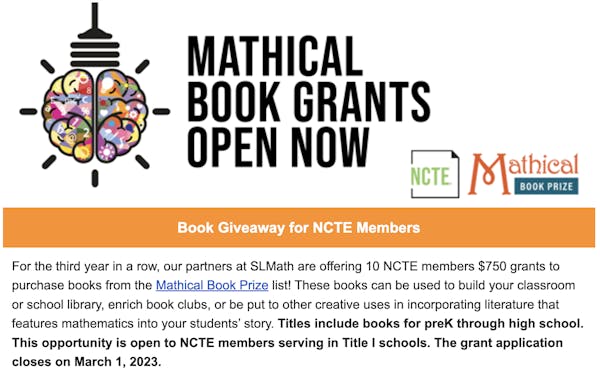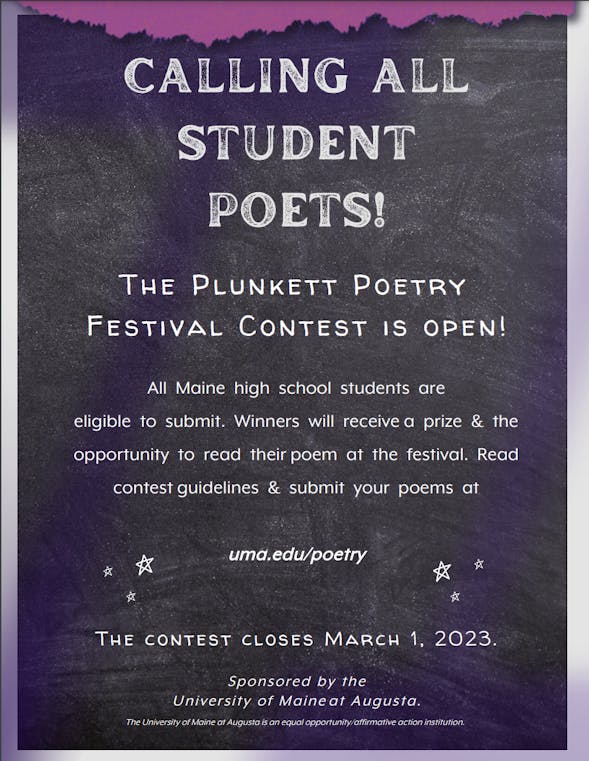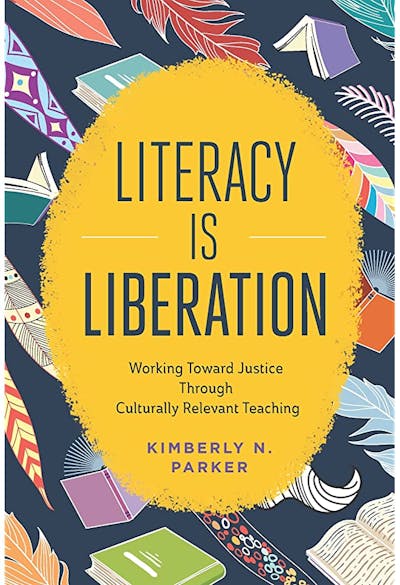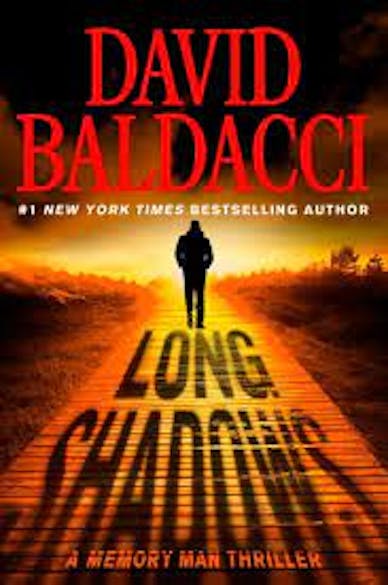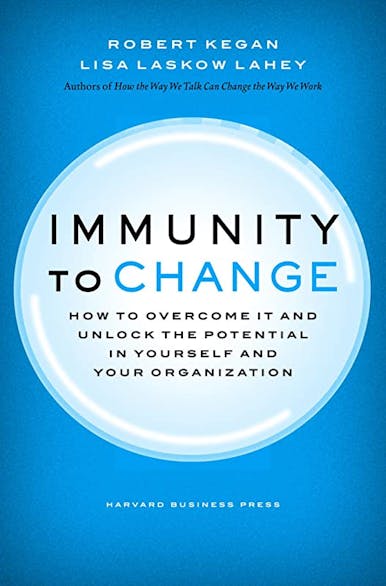MCELA Mattersprograms, resources, connections |
| |
|
 |
February 2023 In this newsletter: - "On Letting Go"
A Message from Claudette Brassil, MCELA Executive Board Member and Retired ELA Educator - "Applying Lessons from Learning a Foreign Language to Instructional Choices"~Dan Murphy, MCELA Board Member and English Department Chair at Bonny Eagle High School
- IDEA Collective: Black History Month
- Conference and Poetry Night registration
- Free Author Webinar
- Book Grants w/ March 1st deadlines
- Plunkett Poetry Contest for students
- MCELA President's book stack
Our March 17, 2023 conference theme this year is a combination of similar concepts that refer to the restoration of something that has been lost or disrupted. "Reconnecting refers to the process of re-establishing a relationship or connection that has been lost or disrupted. Renewing refers to giving new life or energy to something, making it fresh and rejuvenated. Reviving refers to bringing back to life or existence something that has become inactive or has been lost. Together, these concepts suggest a process of restoration, where something that was once lost or inactive is restored to its former state or even made better." (ChatGPT. Note: I just had to try it and simply put in our 3 conference theme words) We are planning and restoring our in-person conference and hope you’ll join us (register here). We think this year's event is equal to if not better than our past conferences. We know it will be an opportunity to connect with like-minded individuals, learn from experts from across the state, and gain new insights and ideas to enhance your professional growth. Click here for the full schedule and program of sessions. Attendee tickets are selling quickly, so register now. In anticipation of reconnecting, renewing and reviving,
Patti Forster, MCELA President maine.ela@gmail.com MCELA website: mainecela.org |
From Claudette Brassil MCELA Executive Board Member Retired High School English Teacher On Letting Go…. From the basement, I have carried up two W.B. Mason boxes filled with most of my personal poetry collection. I have decided to give my books away at the March 16 Poetry Night at Portland Stage. As I rummage through the boxes, I find myself standing at the dining table reading and remembering. Poems by Billy Collins, Mary Oliver, Lawrence Ferlinghetti, Wes McNair, Stuart Kestenbaum, Nikki Giovanni, May Sarton, Edwin Arlington Robinson, Kahlil Gibran, an anthology of poems by President Jimmy Carter, 101 Great America Poems (Longfellow, Poe, Frost, etc.). Is this an eclectic collection? I’m amused by what it may reveal about me. There are a few anthologies of poetry by Stephen Dunn, who I studied with the summer of ’89 out on Martha’s Vineyard, and whose poem, Tiger Face, about finding oneself, became a favorite in my classes. I thumb through the self-published poetry books of Robert Chute, a Bates College biology teacher who I first met at the Haystack Young Writer’s weekends on Deer Isle. Woodshed on the Moon celebrated Thoreau’s trips to Maine, and was a nice companion to The Night Thoreau Spent in Jail. I still regret that I lost my copy of Trieze Lunes/Thirteen Moons, his poems about French Canadians in Maine written in French and then English side by side. I have tried to replace it but even Gary Lawless hasn’t been able to find one, and Prof. Chute has passed away. Big Towns, Big Talk, signed by poet Patricia Smith and Close to Death are souvenirs of the evening I drove up to Farmington in March 1995 with Tom Meyn and Diana Krauss. Her poems, like Always to the Head and The Undertaker, introduced my students to the struggles of young black men at various stages of their lives and conveyed Smith’s hopes, dreams, and fears for her own teenage son. Finally, I reach for The Essential Neruda and am surprised to find a note from Marissa B. who graduated around 2005. The anthology was a gift from her thanking me for being both a friend and a teacher. I read, “This final year has been wonderful because of the independent study you helped me accomplish. Some my best poetry so far has come out of this year and I believe that you had a lot to do with that. I am going to miss Monday afternoons and the time spent alone with you discussing my writing.” So now I have to take a break. I am teary-eyed as memories keep rising: Independent studies, advisor to Aquila, the Mt. Ararat Literary Magazine, trips to Haystack, Creative Writing: Poetry classes, Poet of the Week, and starting each class with a poem. I can’t believe how much I have let go of and put behind me in the years since I retired. I’m in a different time of life—clearing out and letting go of a lot of the “stuff” that has filled my life. I’m going to resist the impulse to try to say something deep and meaningful to you because this moment is all about me and I am happy to be reminded of how much I loved teaching. I promise myself to reread my favorites before the conference so that I can lovingly put them back in the boxes and deliver them to Poetry Night as my gifts to you. ~Claudette Brassil |
From Dan Murphy, NBCT MCELA Executive Board Member English Department Chair Bonny Eagle High School Applying Lessons from Learning a Foreign Language to Instructional Choices As a veteran teacher I have completed a lot of professional development and taken a lot of classes. However recently, as my children have become adults and life has slowed down a bit, I have embraced a new challenge: learning a foreign language. As I have done so, I have begun to ponder how lessons from my own learning might positively impact my own instructional choices. Here are a few thoughts. None are new or surprising, yet they can be easy to forget when we become overwhelmed by the minutiae of teaching. The importance of cultivating a community of learners. Sure, Technology is great, but human connections trump a screen. Most second language learners - French included - have a host of options: apps like Duolingo, podcasts like One Thing in a French Day, and youtube channels like Comme une Francaise. These tools have certainly aided whatever progress I've made. However, situations human connections have kept me motivated and moving forward. The online platform the Conversation Exchange helped me find and befriend a French language partner with whom I speak most Sundays: thirty minutes in English and thirty minutes in French. In addition, the classes I have taken at the Language Exchange in Portland have allowed me to meet others with similar interests. Unlike me, students in most of my classes are part of a captive audience; however, I can tailor my instructional choices to intentionally build classroom communities. For example, at least once a week we'll do a weekly check-in. Sometimes we take a walk; sometimes we stay in the classroom. However, we always stand in a circle and share out. Questions vary, depending on the time of the day and season: "What went well this week?" or "What are you looking forward to this weekend?" It takes only a few moments, but I have found that time spent away from our ipads and other distractions is worthwhile. The centrality of human connections. As an adult learner pursuing my own interests, I am intrinsically motivated. Further, I have been lucky to have a number of outstanding teachers. Aside from their content level knowledge and instructional expertise, however, each took a genuine interest in my progress. Moreover, each designed engaging lessons in ways that tapped into the students' interests and goals. Of course, not all of my English students arrive in our classroom intrinsically motivated. However, I can intentionally make an effort to learn about each students' interests and concerns, whether it's the sports teams they play on, the drama productions that they are practicing for, or the vocational programs that they are pursuing at school. Further, I can design some lessons and units in ways that taps into these areas. The power of seeing progress. While not all students arrive intrinsically motivated, seeing true progress is intrinsically motivating. In language - as in other fields - early progress often gives way to plateaus. Goal setting and testing in my own language journey have helped me weather these periods. Sometimes I've kept plugging away; other times I've taken a needed pause. While technology can be a distraction and google classroom seems an all too ubiquitous presence in schools, my students do have access to much of their prior work - both for my class and in prior classes. Therefore, I have begun to search ways to harness this information in ways that will allow students to see their own progress over time. Seeing that they have in fact made progress will, I hope, spark motivation. As I said earlier, none of the items above are particularly new or surprising. However, struggling to learn a new language has reminded me of a few principles that can help me better plan my instruction and help my students. For years I struggled to correctly pronounce the "ti" sound" in French. Reading aloud in class, I came to feel like Ted Baxter in the old Mary Tyler Moore show: the audience didn't know exactly when he'd mispronounce a word, but it was only a matter of time. Finally, when I did get the sound right, it was a moment of celebration for my whole French class. I hope all of my students at some point feel the joy of learning something new and the support of those learning with them. |
|
|
| Register now! We're starting to fill up. In-person conference March 17, 2023 Open & free to all! Poetry Night March 16, 2023 Portland, ME |
MCELA programming ideas in development: A Zoom Chat about AI and the ELA Classroom. Coming in April 2023. A possible grad class next year through Thomas College led by MCELA members. |
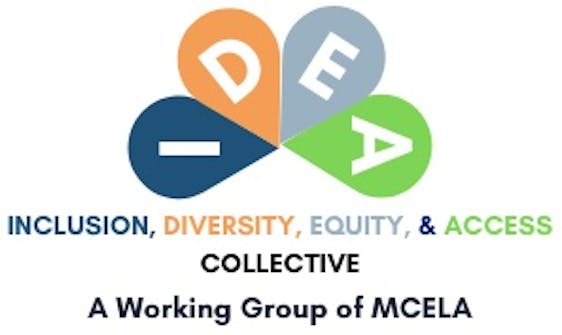 |
The IDEA (Inclusion, Diversity, Equity, and Access) Collective focuses on an important goal: Support Maine educators as they explore ways to develop materials and practices for inclusion, diversity, equity, and access. In particular, MCELA invites educators to think about, discuss, and take steps to address issues related to racism, income disparity, gender identity, environmental justice, equity, genocide, and indigenous sovereignty.Each month, the IDEA Collective of MCELA will share a resource for educators to explore and consider using in their practice and with their students. Elevating Voices In recognition of Black History Month, the IDEA Collective encourages you to explore NCTE’s National African American Read-In. NCTE provides a toolkit to support your efforts in planning a read-in. To celebrate the literary contributions of Black American authors, teachers can share texts each day during the month of February. Also, check out this AARI calendar for 2023 curated by MCELA board members. Access poems, videos, interviews and more resources for your classroom every day of the month! Honoring History This year’s theme for Black History Month is Black Resistance. Here are a variety of resources to guide your planning and discussions. Fostering Inquiry Are you and some colleagues interested in having conversations about antiracism? One of the founding members of the IDEA Collective took inspiration from this organization, Building Anitractist White Educators (BARWE). Created by a group of educators, BARWE provides many resources for classroom teachers, including their monthly inquiry series. Subscribe to their email to receive access to these resources guiding your practice! |
Free Webinar "The transformational power of diverse & inclusive classroom literature to foster empathy, equity, and change." February 16, 2023 |
K-12 full time classroom teachers Deadline March 1, 2023! $1000 Grant for books Application information here: |
Qualifications: Title I school & NCTE Member Deadline March 1, 2023! Submission form here: |
Calling all Maine high school and University of Maine System student poets! The annual Plunkett Maine Poetry Festival High School Student Poetry Contest is now open. The deadline for submission is March 1, 2023.
Students may submit their work using the following guidelines: |
- Contestants may submit up to 3 pieces of original work.
- Please submit a SEPARATE entry for each piece of work.
- Each poem may have a maximum of 52 lines.
- Submissions will be judged blind, so contestants should please make sure their name is not present in their submitted poem document.
- Prior Plunkett Poetry Contest winners are not eligible to participate.
- Poems of all themes and styles are welcome.
|
First, second, and third-place winners will be selected and awarded prizes. In addition, winners will be invited to read their work at the Plunkett Poetry Festival which will be held in April 2023.
Please email contest-related questions to ellen.taylor@maine.edu. |
|
| |
|
Here's what Patti Forster, MCELA President, is reading right now: |
|
|
In Literacy Is Liberation, Parker gives teachers the tools to build culturally relevant intentional literacy communities (CRILCs) with students. Through CRILCs, teachers can better shape their literacy instruction by * Reflecting on the connections between behaviors, beliefs, and racial identity.
* Identifying the characteristics of culturally relevant literacy instruction and grounding their practice within a strengths-based framework.
* Curating a culturally inclusive library of core texts, choice reading, and personal reading, and teaching inclusive texts with confidence.
* Developing strategies to respond to roadblocks for students, administrators, and teachers.
* Building curriculum that can foster critical conversations between students about difficult subjects—including race. In a culturally relevant classroom, it is important for students and teachers to get to know one another, be vulnerable, heal, and do the hard work to help everyone become a literacy high achiever. Through the practices in this book, teachers can create the more inclusive, representative, and equitable classroom environment that all students deserve. ~Amazon |
| When Amos Decker is called to South Florida to investigate a double homicide, the case appears straightforward: A federal judge and her bodyguard have been found dead, the judge’s face sporting a blindfold with two eye holes crudely cut out, a clear sign that she’d made one too many enemies over her years on the bench.
What at first seems cut and dry is anything but: Not only did the judge have more enemies than Decker can count—from violent gang members, drug dealers, and smugglers to a resentful ex-husband—but the bodyguard presents additional conundrums that muddy the waters even further. Who was the real target in this vicious attack?
Meanwhile, Decker must contend with a series of unsettling changes, including a new partner—Special Agent Frederica “Freddie” White—and a devastating event that brings Decker’s own tragic past back to the present . . . and forces him to reckon with his future. As potential witnesses start disappearing, Decker and White are inexorably pulled down a twisted tunnel of secrets, crimes, and scandal—at the end of which lies Decker’s deadliest threat yet. ~Amazon |
| Unlock your potential and finally move forward. A recent study showed that when doctors tell heart patients they will die if they don't change their habits, only one in seven will be able to follow through successfully. Desire and motivation aren't enough: even when it's literally a matter of life or death, the ability to change remains maddeningly elusive. Given that the status quo is so potent, how can we change ourselves and our organizations? In Immunity to Change, authors Robert Kegan and Lisa Lahey show how our individual beliefs--along with the collective mind-sets in our organizations--combine to create a natural but powerful immunity to change. By revealing how this mechanism holds us back, Kegan and Lahey give us the keys to unlock our potential and finally move forward. And by pinpointing and uprooting our own immunities to change, we can bring our organizations forward with us. This persuasive and practical book, filled with hands-on diagnostics and compelling case studies, delivers the tools you need to overcome the forces of inertia and transform your life and your work. ~Amazon |
|
|
| stay tuned via social media |
| |
|
| |
